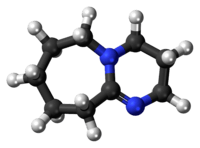1,8-Diazabicycloundec-7-ene
| 1,8-Diazabicyclo[5.4.0]undec-7-ene | |
|---|---|
 | |
 | |
| 2,3,4,6,7,8,9,10-octahydropyrimido[1,2-a]azepine | |
| Other names DBU,Diazabicycloundecene | |
| Identifiers | |
| CAS number | 6674-22-2 |
| ChemSpider | 73246 |
| Jmol-3D images | Image 1 |
| |
| |
| Properties | |
| Molecular formula | C9H16N2 |
| Molar mass | 152.24 g/mol |
| Appearance | Colorless liquid |
| Density | 1.018 g/mL liquid |
| Melting point | −70 °C; −94 °F; 203 K |
| Boiling point | 80-83 °C (0.6 mmHg), 261 °C (1 atm) |
| Acidity (pKa) | ~12 (value for protonated form, pKa of a free base is ~24 -> C-H bond dissociation) |
| Basicity (pKb) | ? (basicity) |
| Hazards | |
| R-phrases | R22 R34 |
| S-phrases | S24 S25 |
| Flash point | 119.9 °C; 247.8 °F; 393.0 K |
| Except where noted otherwise, data are given for materials in their standard state (at 25 °C (77 °F), 100 kPa) | |
| Infobox references | |
1,8-Diazabicyclo[5.4.0]undec-7-ene, or more commonly DBU, is a chemical compound and belongs to the class of amidine compounds. It is used in organic synthesis as a catalyst, a complexing ligand, and a non-nucleophilic base.
This compound is also considered as an alkaloid isolated from the sponge Niphates digitalis.[1]

It is used as a curing agent for epoxy; it is used as a protecting agent for the synthesis of cephalosporin. It is used in fullerene purification with trimethylbenzene (it reacts to C70 and higher fullerenes but not to C60 fullerenes); and it is also used as a catalyst for polyurethane. It has a strong catalyst effect for the reactions of alicyclic and aliphatic isocyanates.
See also
References
- ↑ Regalado, E.L. et al., Nat. Prod. Commun., 2010, 5, 1187- 1190